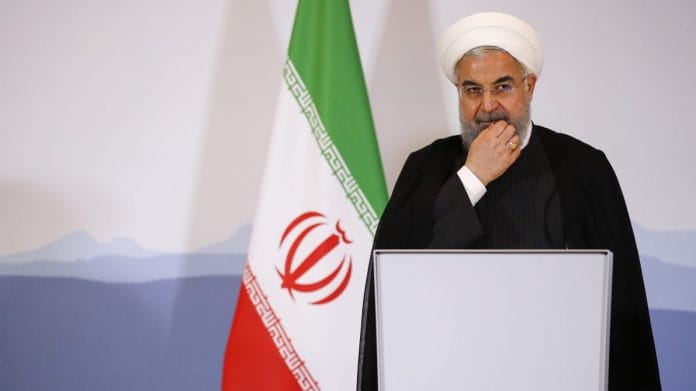New Delhi: Iran’s presidential election kicked off Friday, with voters set to elect a successor to President Hassan Rouhani, who has served the maximum of two consecutive four-year terms allowed by the country’s constitution.
The Guardian Council, a non-elected constitutional vetting body, qualified seven candidates but three withdrew from the race Wednesday. The frontrunner of the remaining four is hardline-cleric Ebrahim Raisi, the country’s chief justice. During the 2017 election, Raisi lost to Rouhani, though the former put up “a surprisingly tough fight”.
In Iran, the President functions as the executive of the decrees and wishes of the Supreme Leader — the head of state. The current lifetime officeholder is Ali Khamenei.
The election comes at a time when Iran and six powers are involved in talks to revive their 2015 nuclear deal also known as Joint Comprehensive Plan of Action (JCPOA). Former US president Donald Trump exited the deal three years ago and reimposed sanctions that crippled Iran’s economy, but the Biden administration is said to be looking to bring it back.
Another key issue is Iran’s financial transparency and developing the country’s action plan with the Financial Action Task Force (FATF) and the JCPOA. Currently, two countries are on the financial watchdog’s blacklist — Iran and North Korea.
Voter turnout, however, is expected to be low during this election amid public disillusionment, with some polls predicting below 40 per cent — the lowest since the country’s 1979 Islamic revolution.
Many Iranians have already said they will not head to the polls due to anger over economic hardship and curbs on personal freedoms. Khamenei raised concern over the issue Thursday, urging the public to come out to vote.
Here is a look at the four main candidates in Iran’s presidential election — Ebrahim Raisi, Abdolnaser Hemmati, Mohsen Rezaei and Amir Hossein Ghazizadeh Hashemi.
Ebrahim Raisi
Currently the head of Iran’s judiciary, 60-year-old cleric Raisi enjoys wide support from conservative and hardline politicians and factions. Like the supreme leader, he wears a black turban, indicating he is a Sayyid — descendant of Prophet Muhammad.
Raisi was appointed by Khamenei as chief justice of the regime’s judicial system in 2019. After his appointment, he said in a speech to the 23rd national assembly of Islamic Revolutionary Guard Corps commanders and officials: “We will not cut the fingers of those who are corrupt; we will cut off their entire hand.” In his campaign, he has vowed to combat poverty and corruption.
Raisi has also come under scrutiny of rights groups for his role as a judge in the executions of thousands of political prisoners in 1988. The state-sponsored executions killed an estimated 4,500-5,000 men, women and children, according to Amnesty.
During a television debate with other candidates last week, Raisi said he will remain committed to the JCPOA like any other state agreement but its implementation requires a “strong” government.
A win for Raisi would be a tangent from the reform agenda headed by Rouhani since 2013, says an analytical report by Al Jazeera.
Abdolnaser Hemmati
A technocrat and moderate, Hemmati served as former governor of the Central Bank of Iran in 2018. The 64-year-old was dismissed from his post by Rouhani earlier this month for running for president.
He took on the post at a time when the Trump administration pulled out of JCPOA and reinstalled sanctions. Hemmati has voiced support for restoring the nuclear deal and lifting sanctions, and promised to increase monthly cash handouts to low-income families.
During a debate with fellow candidates last week, the former journalist harshly criticised internal political forces who oppose the nuclear deal. He has supported ratifying remaining legislation to complete Iran’s financial transparency action plan with the Financial Action Task Force (FATF).
According to an Atlantic Council report, “Many political elites and financial community members in Iran consider Hemmati’s handling of military banks and FATF as reasons he should be the next president.”
Mohsen Rezaei
A former commander-in-chief of the Islamic Revolutionary Guard Corps (IRGC), Rezaei has headed the Expediency Council since 1997. The Expediency Council, an administrative assembly, wields influence through its role as national policy adviser to the supreme leader.
The 66-year-old military figure previously served as the military’s intelligence chief. In 1981, he was appointed by then-Supreme Leader Ayatollah Ruhollah Khomeini as the commander-in-chief of the IRGC and kept that position for 16 years.
The hardliner and war veteran has long resisted the implementation of legislation to satisfy the FATF. Raisi has similarly rallied against such legislation, arguing that it does not guarantee “our nation’s interests”. With regard to JCPOA, Rezaei said Iran must “flip the table, or at least slap the table” when faced with the US backtracking on the deal and leveraging sanctions last week.
Rezaei is also wanted by Argentina on an Interpol “Red Notice” over alleged involvement in the 1994 bombing on a Jewish center in Buenos Aires that killed 85 people.
Amir Hossein Ghazizadeh Hashemi
Ghazizadeh is the youngest presidential candidate at 50 and has been a conservative member of Iran’s parliament since 2008. He has been a representative of Mashhad in parliament for four consecutive terms. He also served as deputy parliament speaker to hardliner Mohammad Bagher Ghalibaf in the first year of the current parliament.
In a televised debate last week, Ghazizadeh highlighted the need to control inflation as the essential economic task of the next Iranian administration. He also promises to reform the country’s tax system.
Also read: Iran’s election is all about supreme leader Khamenei’s toxic legacy






